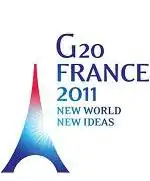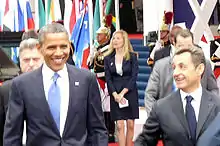2011 G20 Cannes summit
The 2011 G20 Cannes Summit was the sixth meeting of the G20 heads of government/heads of state in a series of on-going discussions about financial markets and the world economy.[1]
| G20 Summit on Financial Markets and the World Economy Sommet du G20 2011 | |
|---|---|
 | |
| Host country | France |
| Date | 3–4 November 2011 |
| Venue(s) | Palais des Festivals Cannes, France |
| Participants | G20 Invited Guests: Ethiopia, Singapore, Spain, United Arab Emirates, Equatorial Guinea Invited Organizations: AU, NEPAD, CCASG |
| Follows | 2010 G20 Seoul summit |
| Precedes | 2012 G20 Los Cabos summit |
| Website | g20-g8.com |
The G20 forum is the avenue for the G20 economies to discuss, plan and monitor international economic cooperation.[2] While the summit achieved little progress on resolving the Eurozone crisis and providing concrete measures to addressing global financial imbalances,[3][4] it did produce some tangible results, including the adoption of the Cannes Action Plan for Growth and Jobs, the launch of the Agricultural Market Information System (AMIS) and the endorsement of an Action Plan on Food Price Volatility and Agriculture.
Priorities
France put agriculture and food security at the heart of the G20 priorities.[5] Around this broad theme, it divided the priorities of the Summit into six areas:
- Reform the International Monetary System.
- Strengthen financial regulation, especially in non-banking financial institutions as well as regulation concerning financial market integrity and transparency.
- Reduce excessive commodity price volatility and enhance food security.
- Support employment and strengthen the social dimension of globalization.
- Fight corruption, for example by ensuring that the Anti-Corruption Action Plan adopted in the 2010 G20 Seoul summit will produce concrete results and real progress starting in 2011.
- Support infrastructure development and enhance food security in the most vulnerable countries.
Outcomes
The Summit took place in the aftermath of the 2007-08 financial crisis and in the midst of the evolving Eurozone crisis. Against this background, the outcomes of the Summit can be considered as insufficient in providing clear solutions for restoring and strengthening the global economy.
However, the Summit did result in a number of initiatives, most notably in the area of agriculture and food security. Especially the launch of the Agricultural Market Information System (AMIS) and the endorsement of an Action Plan on Food Price Volatility and Agriculture are tangible steps to addressing the world agriculture and food challenge. The G20 Summit also tasked the GEO Global Agricultural Monitoring (GEOGLAM) initiative to produce and disseminate improved forecasts of agricultural production through the use of earth observations.
Attendance


Attendance at the Cannes summit included leaders and representatives of the core members of the G20,[6] which comprises 19 countries and the European Union which is represented by its two governing bodies, the European Council and the European Commission.[7] Representatives of other nations and regional organizations were also invited to take part in the summit.
Protests
At the summit protesters donned Robin Hood caps and demanded a tax on international financial transactions in order to provide aid to poor countries instead of catering to banking and other financial institutions.[34] They also chanted slogans in opposition to "corporate greed" and supported a counter-G20 summit, "People First, Not Finance", organised by labour unions and NGOs such as Greenpeace and Oxfam. Though police reported 5,500 were part of the protests, the organisers estimated the number of protesters at 12,000. The riot police and helicopters limited the scope of the protests to a neighbourhood in the east of Nice, which was to host the alternative summit as well as the protests. Both Cannes and Nice also tightened security, with 12,000 police personnel being deployed.[35]
See also
References
- "Legacies of the G20 Seoul Summit," Archived 2010-11-14 at the Wayback Machine Choson Ilbo (ROK). 13 November 2010; retrieved 13 February 2011
- Parliament (UK): Townsend, Ian. "G20 & the November 2010 Seoul summit" (SN/EP/5028) Archived 2010-11-07 at the Wayback Machine, 19 October 2010, retrieved 2011-04-07; excerpt, "Today, we designated the G-20 as the premier forum for our international economic cooperation" citing "Pittsburgh G20 Leaders’ summit communiqué," ¶50 September 29, 2009, retrieved 2011-04-07; excerpt, "Today, we designated the G-20 as the premier forum for our international economic cooperation. We have asked our representatives to report back at the next meeting with recommendations on how to maximize the effectiveness of our cooperation. We agreed to have a G-20 Summit in Canada in June 2010, and in Korea in November 2010. We expect to meet annually thereafter, and will meet in France in 2011."Archived copy" (PDF). Archived from the original (PDF) on 2010-11-07. Retrieved 2011-04-07.CS1 maint: archived copy as title (link)
- "Archived copy". Archived from the original on 2011-11-05. Retrieved 2011-11-05.CS1 maint: archived copy as title (link)
- Kevin Gallagher (2010-11-29). "The IMF must heed G20 decisions". London: The Guardian. Archived from the original on 2014-02-04. Retrieved 2011-12-15.
- "The Cannes Summit: What Outcomes?". French Presidency of the G20. Archived from the original on 6 June 2014. Retrieved 6 June 2014.
- "G20 Cannes Draft Program". www.g20.utoronto.ca. Retrieved 2019-11-04.
- Rieffel, Lex. "Regional Voices in Global Governance: Looking to 2010 (Part IV)," Archived June 3, 2010, at the Wayback Machine Brookings Institution (US). 27 March 2009, retrieved 2011-04-06; "G20 members," Archived 2011-08-13 at the Wayback Machine Government of Canada, retrieved 2011-04-06.
- Argentina, G20/2011 official site; retrieved 12 February 2011
- Australia, G20/2011 official site; retrieved 12 February 2011
- Brazil, G20/2011 official site; retrieved 12 February 2011
- Canada, G20/2011 official site; retrieved 12 February 2011
- China, G20/2011 official site; retrieved 12 February 2011
- France, G20/2011 official site; retrieved 12 February 2011
- Germany, G20/2011 official site; retrieved 12 February 2011
- India, G20/2011 official site; retrieved 12 February 2011
- Indonesia, G20/2011 official site; retrieved 12 February 2011
- Italy, G20/2011 official site; retrieved 12 February 2011
- Japan, G20/2011 official site; retrieved 12 February 2011
- Mexico, G20/2011 official site; retrieved 12 February 2011
- Russia, G20/2011 official site; retrieved 12 February 2011.
- Saudi Arabia, G20/2011 official site; retrieved 12 February 2011
- South Africa, G20/2011 official site; retrieved 12 February 2011
- South Korea, G20/2011 official site; retrieved 12 February 2011
- Turkey, G20/2011 official site; retrieved 12 February 2011
- United Kingdom, G20/2011 official site; retrieved 12 February 2011
- G20/2011 official site; retrieved 12 February 2011 Archived July 11, 2011, at the Wayback Machine
- European Commission, G20/2011 official site Archived 2012-06-16 at the Wayback Machine; retrieved 12 February 2011.
- Secretariat General of the French Presidency of the G20 and G8, Invitation to Non-Members of the G20 to the G20 Summit of Cannes on November 3 and 4, 2011," 12 February 2011; retrieved 12 February 2011
- G-20 Archived 2010-11-19 at the Wayback Machine, Home>Links>Institutional members Archived 2011-01-03 at the Wayback Machine; retrieved 12 February 2011
- Jessop-Kolesnikov, Sonia. "As G-8 Meets, Asian Leaders Seek a Bigger Role," Archived 2017-09-23 at the Wayback Machine New York Times (US). 25 May 2011; excerpt, The Global Governance Group, conceptualized in April 2009 at the 2009 G20 London summit meeting, includes 28 countries: Bahamas, Bahrain, Barbados, Botswana, Brunei, Chile, Costa Rica, Guatemala, Jamaica, Kuwait, Liechtenstein, Malaysia, Monaco, Montenegro, New Zealand, Panama, Peru, Philippines, Qatar, Rwanda, San Marino, Senegal, Singapore, Slovenia, Switzerland, United Arab Emirates, Uruguay and Vietnam"; retrieved 2011-05-26
- G20-G8 France 2011, English>What is the G20?>Who are its members?; retrieved 13 February 2011
- Fontevecchia, Augustino. "IMF Appoints Lagarde To Fix A Disgraced Institution," Archived 2011-07-01 at the Wayback Machine Forbes (US). 28 June 2011.
- "Ethiopia - Meles Zenawi quits NEPAD leadership post - PANA reports". Nazret.com. Archived from the original on 2011-09-30. Retrieved 2011-11-04.
- Richardson, Clare (2008-11-15). "G20 2011: Protests Ahead Of Summit In Cannes, France (PHOTOS)". Huffingtonpost.com. Archived from the original on 2016-02-01. Retrieved 2011-11-04.
- Angelique Chrisafis in Nice (1 November 2011). "Anti-G20 protests confined to Nice as police seal off 'fortress Cannes' | World news". London: The Guardian. Archived from the original on 1 October 2013. Retrieved 2011-11-04.
External links
| Wikimedia Commons has media related to 2011 G-20 Cannes summit. |